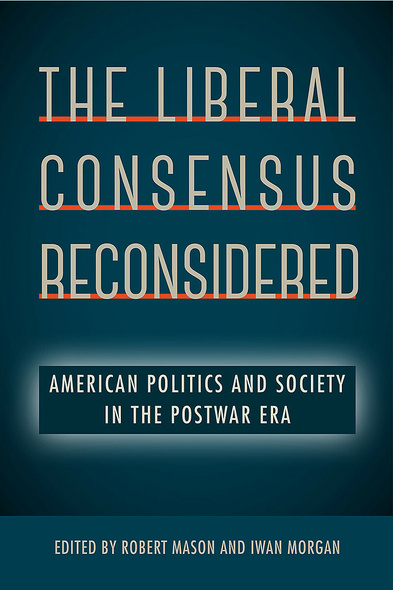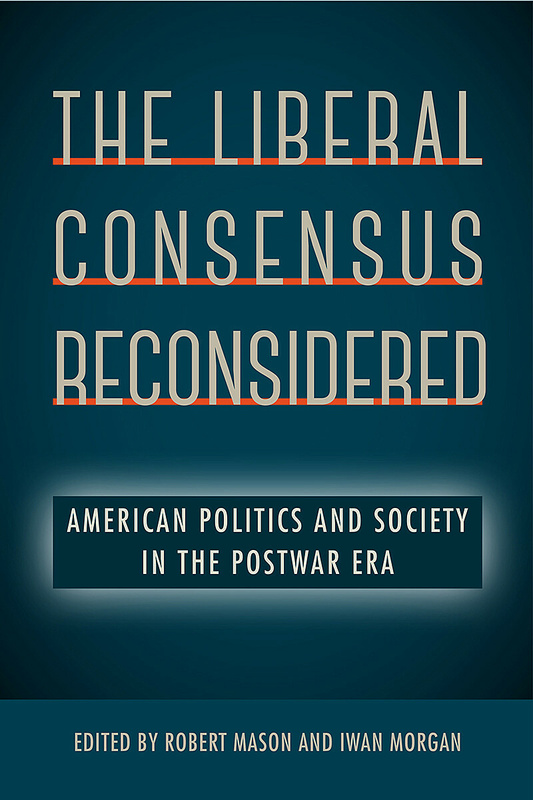
The Liberal Consensus Reconsidered
American Politics and Society in the Postwar Era
When first published in 1976, Godfrey Hodgson’s America in Our Time won immediate recognition as a major interpretive study of the postwar era. In The Liberal Consensus Reconsidered, leading scholars—including Hodgson himself—confront his long-standing theory that a “liberal consensus” shaped the United States after World War II. These essays offer new insights into the era and diverging opinions on one of the most influential interpretations of mid-twentieth-century U.S. history.
Contributors offer a broad range of insights into Hodgson’s thesis, considering it in the context of historiography, its roots in the 1930s, and its relation to Keynesian thought and policy. . . . Essential.’—Choice ‘An excellent series of essays on the concept of the ‘liberal consensus.’ . . . Provocative, thoughtful, and persuasive.’—Journal of American History
An exceptionally fine collection that distills the very latest writing on mid-twentieth-century U.S. politics and society.’—Gareth Davies, author of From Opportunity to Entitlement: The Transformation and Decline of Great Society Liberalism ‘Offers a diverse mix of interpretations that demonstrate how this era was often marked by intense political and cultural conflict. Rightly cautions against drawing too sharp a contrast between this period and the polarization of our time.’—Timothy N. Thurber, author of Republicans and Race: The GOP’s Frayed Relationship with African Americans, 1945–1974
Robert Mason, professor of history at the University of Edinburgh, is the author of The Republican Party and American Politics from Hoover to Reagan. Iwan Morgan, professor of United States studies at University College London, is the author of Reagan: American Icon and coeditor of From Sit-Ins to SNCC: The Student Civil Rights Movement in the 1960s.
Content Introduction: Reconsidering the Liberal Consensus 1 Robert Mason and Iwan Morgan 1. Revisiting the Liberal Consensus 12 Godfrey Hodgson 2. Historians and the Postwar Liberal Consensus 29 Michael Heale 3. The Reach and Limits of the Liberal Consensus 52 Gary Gerstle 4. The 1930s Roots of the Postwar “Consensus” 67 Wendy L. Wall 5. The Keynesian Consensus and Its Limits 86 Iwan Morgan 6. Social Welfare in the United States, 1945–1960 108 David Stebenne 7. Red-Hunting and Internal Security: Conflict in the Age of Consensus 127 Alex Goodall 8. Containment: A Consensual or Contested Foreign Policy? 148 Andrew Preston 9. Sunbelt Patriarchs: Lyndon B. Johnson, Barry Goldwater, and the New Deal Dissensus 167 Elizabeth Tandy Shermer 10. “Down the Middle of the Road”: Dwight D. Eisenhower, the Republican Party, and the Politics of Consensus and Conflict, 1949–1961 186 Robert Mason 11. “We Have Run Out of Poor People”: The Democratic Party’s Crisis of Identity in the 1950s 208 Jonathan Bell 12. Billy Graham’s Neo-evangelical Triumph and the Limits of the Liberal Consensus 227 Uta A. Balbier 13. Gender in an Era of Liberal Consensus 245 Helen Laville 14. Memories of the Movement: Civil Rights, the Liberal Consensus, and the March on Washington Twenty Years Later 262 George Lewis Contributors 283 Index 287




